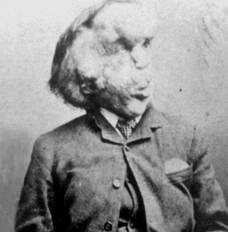 |
| Joseph Carey Merrick "The Elephant Man" (Photo credit: Wikipedia) |

I recently re-watched one of my favourite films, “The Elephant Man”. Released in 1980, this is perhaps one of director David Lynch’s most conservative pieces. The director’s notoriously surreal style is restricted to short dream sequences instead of dominating the piece as he is often want to do. I like some of Lynch’s work, particularly “Lost Highway”, and I am also an admirer of the two stars of the film, Anthony Hopkins, who plays the compassionate Dr. Treves, and John Hurt, who plays his most famous patient and the film’s eponymous hero, the tragically disfigured and disabled John Merrick (actually a portrayal of the real-life Joseph Carey Merrick). When I saw this film as a child it was the first feature I ever recall moving me to tears. Imagine my horror years later when I heard a rumour that Mr. Merrick was once an employee of my Victorian ancestors. Later on I found that this rumour was suspicious at best, but what I did uncover was a very different story about the life of Joseph Merrick. I also had to face the fact that a loved film “The Elephant Man” reflects much of the Edwardian snobbery that set a firm divide between the “high art” of straight theatre, a representative of dignity in the film, and the "low art" of sideshows, which the film depicts as the representative humiliation and exploitation.